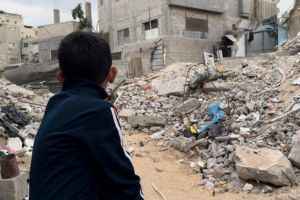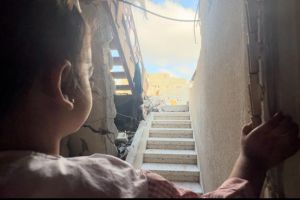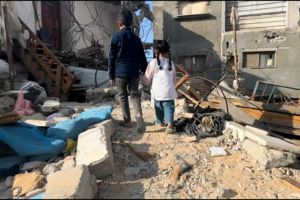Amr is a media officer with the Palestine Red Crescent Society. Like many of his colleagues, his family has been impacted by the ongoing conflict in Gaza. We first introduced Amr after his family fled the north of Gaza to Khan Younis. We connected with him again, one year after the escalation of hostilities.
It has been one year and five displacements for Amr and his family as they repeatedly looked for safety alongside nearly 2 million other people in Gaza.
During the summer, they were able to return to the destroyed shell of his brother’s house in Khan Younis after leaving Rafah and repaired two of the rooms to stay in.

Every day starts the same for Amr, rising early and struggling to find food and carry water for his family. It takes significant time and is physically difficult. For people in Gaza who still have an income, often making less than $300 a month, every day is a struggle to afford essentials. A kilogram of tomatoes now costs about $13, and a carton of 30 eggs, $30.
“This means that even the most fundamental ingredients are becoming luxuries that many families can no longer afford,” Amr said.
Balancing work and family life
Amr heads to work, documenting the humanitarian response of the Palestine Red Crescent Society (PRCS). It could be that an explosion has filled the emergency room at the PRCS Al Amal hospital with injured people, or he is telling the stories of the outreach being done by PRCS staff and volunteers.
“When I return home, my work is far from over. My brother and I dedicate ourselves to repairing the house,” Amr said. “Our goal is to create a safe and livable environment for our children. This involves clearing away sharp metals and other hazardous materials to ensure they have a secure place to play and rest.”
“Around us are thousands of displaced people from the neighbourhoods. They fled here and they are now in the open air, sleeping there and cooking without any shelter. Even in the Al Mawasi area, it is full. Maybe hundreds of thousands of people, so you cannot find a step for you. It’s horrific.”
The impact on children’s health
Information from the United Nations says 1.9 million people have been ordered to move to an area of 48 square kilometres. This means these areas are some of the most densely populated in the world, but without the infrastructure of a city. It has led to significant overcrowding, with people living in tents or under tarps with untreated wastewater and sewage in the streets and a lack of hygiene supplies.As a result, these conditions are leading to diseases spreading at an alarming rate.
“My children have been exposed to numerous infections and illnesses over the past few months, which have significantly affected their health, and of course, we have not found treatment for them,” Amr said.
“My daughter, Maria, suffered from a small wound on her foot that remained open for more than a month due to the lack of proper treatment -- infection and contaminated dust prevented it from healing.”
While Amr’s wife regularly comes up with activities to help their children learn or have space to play, there is no opportunity for formal education or playing with friends.

“Even if there were a place for education, time for learning is a luxury we cannot afford amidst this chaos,” Amr said, adding that makeshift classes have started in some areas, but the family is afraid to send their children the few kilometres away in case they need to evacuate again.
“Maria no longer knows the joy of playing; her toys are now only stones and sand, as the conflict has stolen her childhood.”
Read more about Amr and his family:
Surviving Uncertainty: A Family in Gaza Flee Khan YounisAmr's Story: Balancing Family, Work, and Survival in Gaza
Palestine Red Crescent Society staff and volunteers continue providing medical care in hospitals and medical posts, ambulance services, public health messaging, and psychosocial support to people in Gaza. Teams are also establishing shelter centres for displaced people and distributing life-saving aid as often as possible, such as food, water, and emergency items. They do this despite worrying about their families, living in difficult conditions, and navigating the risk of harm.
People wishing to help are encouraged to donate to the Middle East Humanitarian Crisis Appeal.

